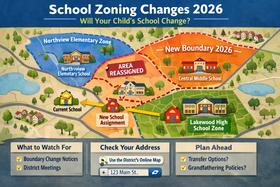Budget cuts have forced public schools to reduce their curriculum offerings, increase class sizes, and cut back on teacher positions. However, to fill the fiscal gap, many schools are taking even more drastic measures to reduce their operating costs.
The costs of new textbooks, classroom materials, and even handouts can result in massive school expenses. Subsequently, many public schools are now requiring students to purchase their own materials and books! As a result, many families may be forced to increase their education spending to meet their child’s classroom needs.
This video offers an overview of public K-12 education in the United States.
Cutting Jobs, Classes...and Textbooks?
When schools are faced with budget costs, most districts begin by eliminating faculty positions; however, reducing the number of teachers and administrators can only go so far on the bottom line. If school leaders reduce their faculty numbers, but still have not met their budgetary restrictions, then leaders are forced to develop new, and often controversial, alternatives.
For example, according to ABC News, schools across the state of California are hoping to reduce their spending by using older textbooks for longer periods of time. While California schools have already eliminated various educational programs, along with teaching and faculty positions, these cuts are simply not enough – and new textbooks are literally getting the ax.
In fact, school leaders report that the state of California will not be





















